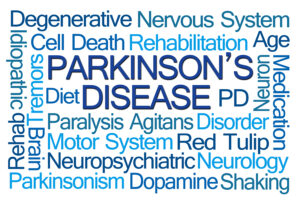In-Home Care – Symptoms Of Parkinson’s Seniors Should Know

Parkinson’s disease is a disorder that occurs when the brain stops making dopamine. Dopamine is a substance that affects motor skills and mobility. It’s a progressive disorder, and there is no cure. There are more than a million people living with Parkinson’s disease. But early treatment can help to slow the progression of the disease.
Often people think that if they get Parkinson’s disease they won’t be able to live independently. But, with in-home care many seniors can continue to live in the homes they love. In-home care can help seniors with tasks that are difficult for them like house cleaning, getting around the house, getting dressed, and cooking meals.
Because early detection of Parkinson’s and early treatment can impact how quickly the illness progresses, seniors and their families need to know the symptoms of Parkinson’s. If your senior parent starts to mention having any of these symptoms they should see a doctor right away:
Tremors
Tremors are probably the most recognizable symptom of Parkinson’s disease. Most people notice tremors before other symptoms. But tremors can be caused by other conditions. Seniors who notice that they have a slight tremor should always see their doctor to get assessments for Parkinson’s disease.
Bradykinesia
Bradykinesia is a big word that really just means slowed movement. It’s another of the most common symptoms of Parkinson’s. Seniors experiencing bradykinesia may find it challenging to initiate and complete movements, making simple tasks like buttoning a shirt or walking more difficult and time-consuming.
Muscle Rigidity
Muscle stiffness or rigidity is common in Parkinson’s disease. It can cause discomfort and limit the range of motion in affected limbs. The muscles may feel tense and resist being moved passively.
Poor Posture
As Parkinson’s progresses, individuals may experience problems with balance and posture. They may have difficulty maintaining an upright posture and may be more prone to falls. Seniors that have always had good posture who suddenly seem to stoop or have poor posture should be checked for Parkinson’s.
A Change In Balance
Parkinson’s can lead to impaired coordination and balance, increasing the risk of falls and injuries. It’s also common for seniors to develop a slow, shuffling gait and have problems picking up their feet when they have Parkinson’s. This can make it difficult for seniors to move around the house without help.
Reduced Ability To Swing Arms While Walking
People with Parkinson’s often have reduced arm swing on one or both sides while walking. This reduced arm movement is a characteristic feature of the disease and can contribute to a stooped posture. At first this symptom may not seem like a symptom. But seniors who notice that they are experiencing reduced arm swing should get a medical checkup.
Masked Face
Also known as “masked facies,” this refers to a reduced range of facial expressions. People with Parkinson’s may have a blank or emotionless facial expression, making it challenging for others to interpret their emotions.
Sleep Problems
Seniors are often prone to sleep problems, so seniors that experience sleep problems may not have Parkinson’s. However, seniors that develop sleep problems like insomnia, restless legs, and inability to stay asleep should be tested for Parkinson’s.
If you or someone you know needs help with in-home care in East Grand Rapids, MI, contact Gauthier Family Home Care. We provide quality and affordable home care services in our community. Call us at (616) 258-2300 for more information.
Source 1 / Source 2 / Source 3 / Source 4
- What Role Does Nutrition Play in Healthy Aging? - May 1, 2024
- Caregiver of the Month – May 2024 - April 30, 2024
- Understanding Osteoporosis and What to Look for in Your Aging Loved Ones - April 23, 2024
